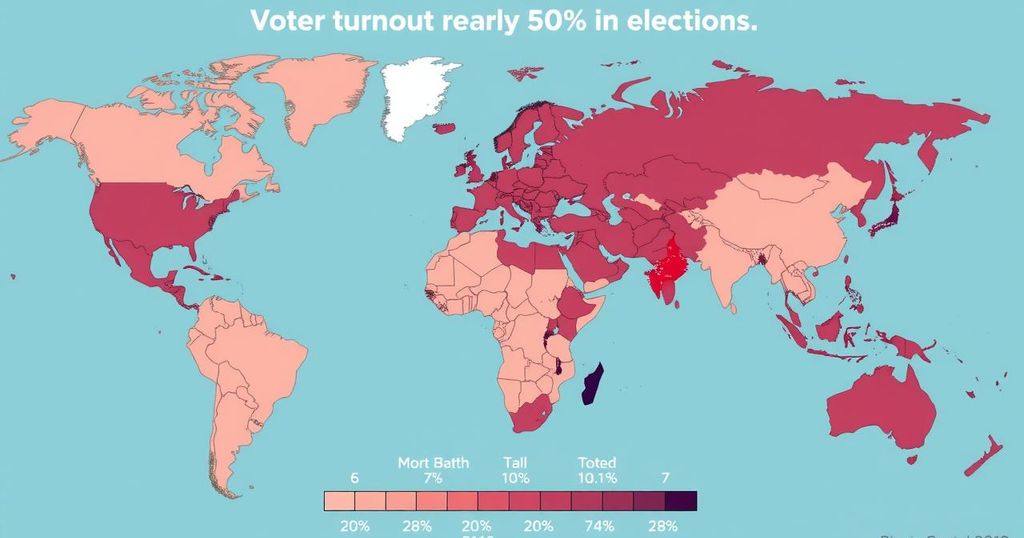2024: A Historic Year for Global Democracy amidst Complex Challenges
The year 2024 witnessed historic global voter participation across over 60 nations, yet results revealed that economic concerns dominated ballot choices, revealing a self-serving trend. Leaders like Biden and Modi faced electoral setbacks due to economic dissatisfaction, while Putin’s regime illustrated challenges within democratic frameworks. Overall, the electoral landscape highlights the duality of progress and struggle facing global democracy, underscoring the importance of continued engagement and reform.
The year 2024 marked a historic milestone for global democracy as nearly half the world’s population, across more than 60 nations, participated in voting to select their leaders. However, despite this impressive turnout, the results reflected a prevailing trend of self-interest among voters, where economic concerns overshadowed significant issues such as climate change. In prominent industrialized states, immediate economic stability took precedence, which influenced electoral outcomes, such as the Labour Party’s decisive victory in the United Kingdom and a shifting political landscape in the United States characterized by a return to Donald Trump.
President Joe Biden’s struggle to combat inflation, coupled with stagnating wages, resulted in discontent that translated into a desire for change among American voters. This electoral behavior was not limited to the U.S.; globally, incumbents were ousted in several regions, revealing a pattern that favored political survivalism based on immediate economic crises. In India, Prime Minister Narendra Modi’s ruling party faced a loss, while South Africa’s ruling party, historically led by Nelson Mandela, lost its parliamentary majority for the first time.
Moreover, the electoral system in Russia demonstrated a stark contrast to democratic principles, as President Vladimir Putin’s reelection featured overwhelming but suspicious support amidst notable repression of opposition groups. Such scenarios highlight the complexities of democracy, where the exercise of voting can sometimes lack fundamental fairness and freedoms. The 2024 elections, therefore, signal a critical juncture in the evolution of global democratic practices, particularly in an era challenged by economic volatility and geopolitical tensions.
Macron’s gambit in France, reacting to the gains of populist parties in the EU, serves as a reminder that democratic values endure challenges; his recent elections brought significant shifts, albeit leading to political instability shortly thereafter. As political dynamics fluctuate, the hope remains that democracy can adapt and emerge resilient despite prevailing challenges, paving the way for future generations seeking equitable governance.
Hence, 2024 exemplified the ongoing evolution of democracy worldwide, exposing both its triumphs and shortcomings. The desire among many for a more inclusive and fair system of governance persists, even in the face of disheartening outcomes, suggesting a continuation of democratic engagement into the future as nations advance towards more just electoral practices.
The 2024 elections were monumental, reflecting a significant portion of the world’s population engaging in democratic processes. This period prompted a worldwide examination of voter intentions and the ideological shifts observed in various countries. It also brought to light the ongoing struggle for true democratic representation, especially against the backdrop of economic challenges and the reluctance to address global issues such as climate change. The juxtaposition of democratic ideals versus authoritarian practices raised pertinent discussions regarding the evolution and integrity of global democracy.
The engagement of nearly half the global population in democratic elections speaks volumes about the state of governance around the world. While 2024 witnessed increased participation in electoral processes, it also unveiled stark reminders of self-interest and pressing economic concerns that often overshadow broader democratic values. Moving forward, the international community must prioritize fostering true democratic environments, inclusive policymaking, and an unwavering commitment to confronting critical global challenges. Thus, the persistence of democratic ideals amidst trials will be vital for future generations.
Original Source: edition.cnn.com




Post Comment